- 29 March 2016
- Technology
-
(테크놀로지) 제3자에 의해 열린 아이폰을 걱정해야 하는가?과학과 테크놀로지/테크놀로지 2016. 3. 30. 15:42
출처: http://www.bbc.com/news/technology-35916857
Cracked iPhone: Should you be worried? 우리는 제3자에 의해 열린 아이폰을 걱정해야 하는가? (cracked: 금간, 틈이 생긴, 여기선 "FBI에 의해 열린"이란 뜻.)
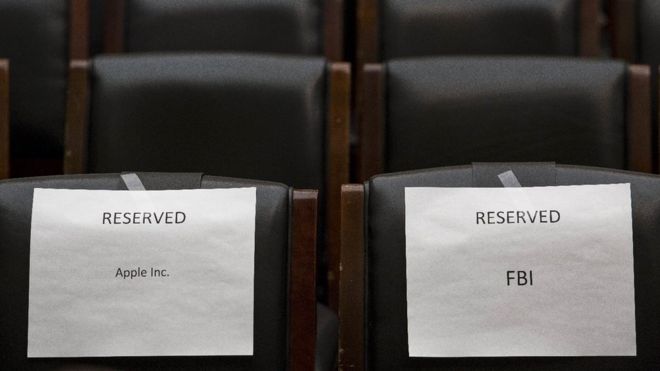 Getty Images
Getty ImagesThe FBI's breakthrough means it avoids having to face Apple's lawyers in court The US government's declaration that it has "successfully accessed the data stored on [San Bernardino gunman] Farook's iPhone and therefore no longer requires" assistance from Apple, ends a six week-long legal clash between the tech firm and the FBI.
But it leaves the issue at the heart of the dispute unresolved: could the FBI have forced Apple to help it unlock the device?
It is unlikely that this will be the last time a law enforcement agency tries to compel a tech company to help bypass security measures.
What are the implications for other cases?
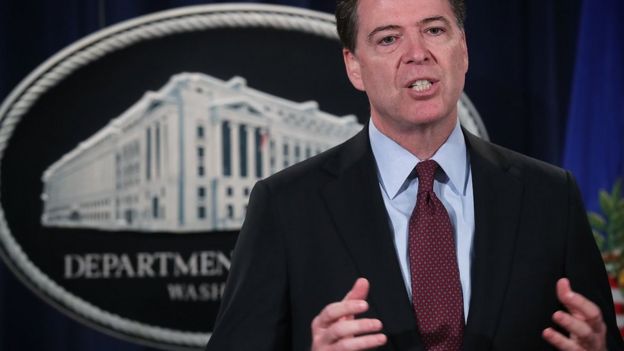 Getty Images
Getty ImagesFBI director James Comey had previously suggested only Apple could help it crack Farook's iPhone It had been reported that there were about a dozen other cases in which the US Justice Department was pursuing court orders to force Apple to help its investigators.
The highest profile of these was in Brooklyn, New York, where the FBI wanted access to an iPhone belonging to a defendant who had already pleaded guilty to drug dealing.
In that case, a federal judge had rejected the DoJ's effort to invoke the All Writs Act - a three-centuries-old statute that allows court orders to be issued in circumstances where other laws don't apply.
The DoJ had launched an appeal, but it is not yet clear if it will continue or drop it. Its decision may be based on whether the technique used to extract data from Farook's handset can be used in other cases.
The New York case involved an iPhone 5S running the iOS 7 operating system, while the San Bernardino, California case was about an iPhone 5C running the more modern iOS 9. What works against one device might not work against the other.
But assuming the US government will at some point try again to use the All Writs Act to force Apple or some other tech company to circumvent its data protection measures, it may take a Supreme Court ruling to determine whether this is truly within the authorities' power.
Is there any way to find out how Farook's iPhone was cracked?
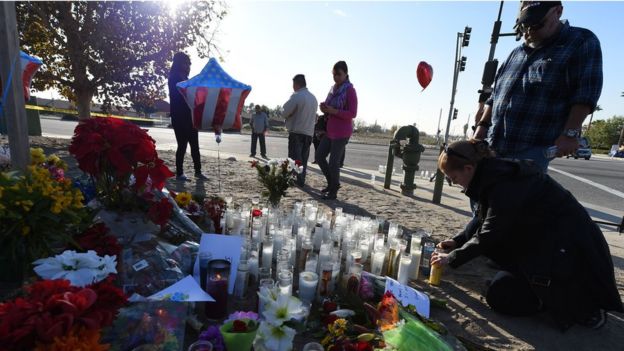 Getty Images
Getty ImagesFourteen people were killed and 22 were seriously injured in the attack by Farook and his wife At this point, there is nothing to compel the FBI to reveal how it was done, although Apple is likely to be pressing hard to find out.
The tech firm's lawyers have already said they would want details of the technique to be made public if evidence from the cracked iPhone is later used at trial.
But it could remain secret. There is scope within US law for the authorities to withhold the source of information if it was supplied to them on a confidential basis, and to protect sensitive intelligence-gathering methodologies.
Should I assume the US authorities can now easily work out any iPhone's passcode?
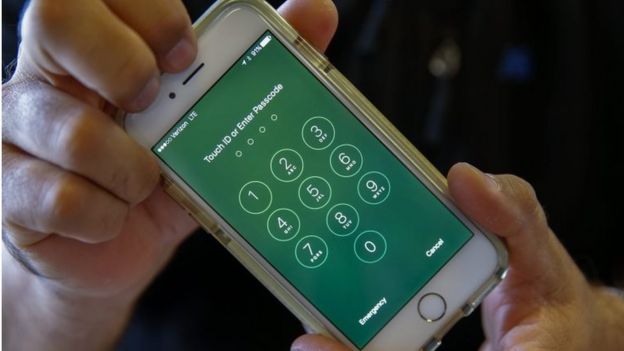 EPA
EPAiPhones can be set to wipe their data after 10 incorrect entries Not necessarily.
The court order originally obtained by the FBI had instructed Apple to come up with a special version of its operating system that would have prevented Farook's iPhone from deleting its data or imposing long lockout periods if too many incorrect passcode guesses were made.
However, the latest court filings do not say that someone else has now done this, but merely that some data stored on the device has been obtained.
Researchers at the cybersecurity firm IOActive had proposed that one way of getting data off an iPhone would be to "de-cap" its memory chips.
The process they described involved using acid and lasers to expose and copy ID information about the device so that efforts to crack its passcode could be simulated on another computer without risk of triggering the original iPhone's self-destruct tool.
If indeed this is what happened, it is not easy and there's a high risk of causing so much damage to the phone that the desired data becomes irretrievable.
By contrast, Cellebrite - a data forensics firm that has reportedly helped the FBI with the case - has previously discussed "bypassing" passcode locks rather than trying to deduce the number.
But it is possible that doing this would yield access to only a limited amount of a handset's data.
One other point is that Apple recently updated its iOS software.
Each upgrade adds security fixes. So, if the FBI has indeed been alerted to a flaw in Farook's phone's security settings, that bug may no longer exist in devices that have installed iOS 9.3.
Is there any way to ensure no-one else can read the information held on my handset?
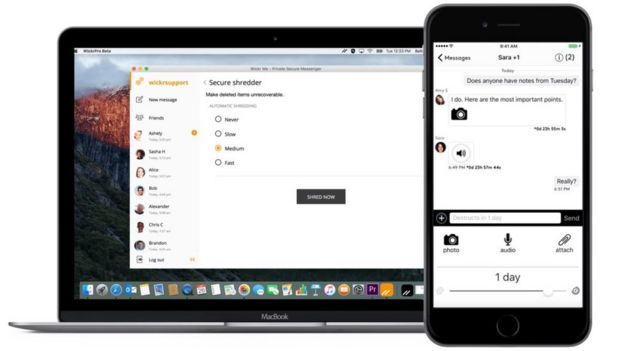 Wickr
WickrWickr allows you to set a complex passcode that needs to be entered to log back into the app Short of destroying the device, perhaps no.
But you can use encryption-enabled apps to digitally scramble data.
The chat tool Wickr Messenger, for instance, lets you set it so that you have to enter a password each time you log back into the app.
Likewise, PQChat requires typing in a five-digit passcode of its own to get access.
So, even if a cracked iPhone did give up the contents of its text messages, emails and WhatsApp chats, the contents of the apps mentioned above should remain safe.
All this presumes, however, that the authorities do not manage to install spyware on your device. If that happens, all bets are off.
What is the situation in the UK?
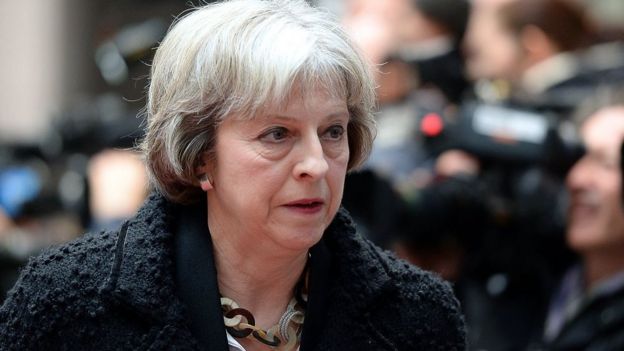 Getty Images
Getty ImagesTheresa May intends to bring a new surveillance law into effect soon in the UK As part of her efforts to pass the Investigatory Powers Bill, the home secretary Theresa May has said that tech firms wouldn't have hand over encryption keys or build backdoors into their platforms.
But the law still makes mention of "equipment interference warrants".
Campaigners at the Electronic Frontier Foundation have warned that these could be used to force Apple and others to insert new code into a device in order to help the authorities extract data, in a similar manner to the FBI's earlier order.
The EFF adds that "matching gag orders" would prevent the firms from informing their customers or even their own lawyers about the act.
Equipment interference warrants already exist under the UK's current law.
And for now, the focus of Apple and other tech firms is getting the Investigatory Powers Bill amended to say that in the future the warrants could only be amended with the permission of a judge.
But were there to be a case where the UK police attempted to coerce Apple to override its protective measures, it might still resist - even if the fact never became public.
'과학과 테크놀로지 > 테크놀로지' 카테고리의 다른 글
(테크놀로지) YouTube 가상현실 동영상 실시간 전송에 3D음향 추가 (0) 2016.04.19 (테크놀로지) 내일의 스마트 사무실은 구세주일까 스파이일까? (0) 2016.04.03 (테크놀로지) 피해자에게 몸값 요구하는 악성코드 랜섬웨어(ransomware)에 대한 경고 (0) 2016.03.30 (테크놀로지) FBI 자동차 해킹의 위험 경고 (0) 2016.03.22 (테크놀로지) 현대전에서 트위터의 역할 (0) 2016.03.22